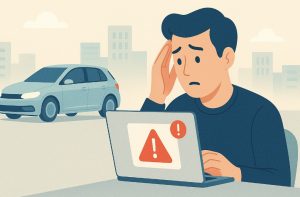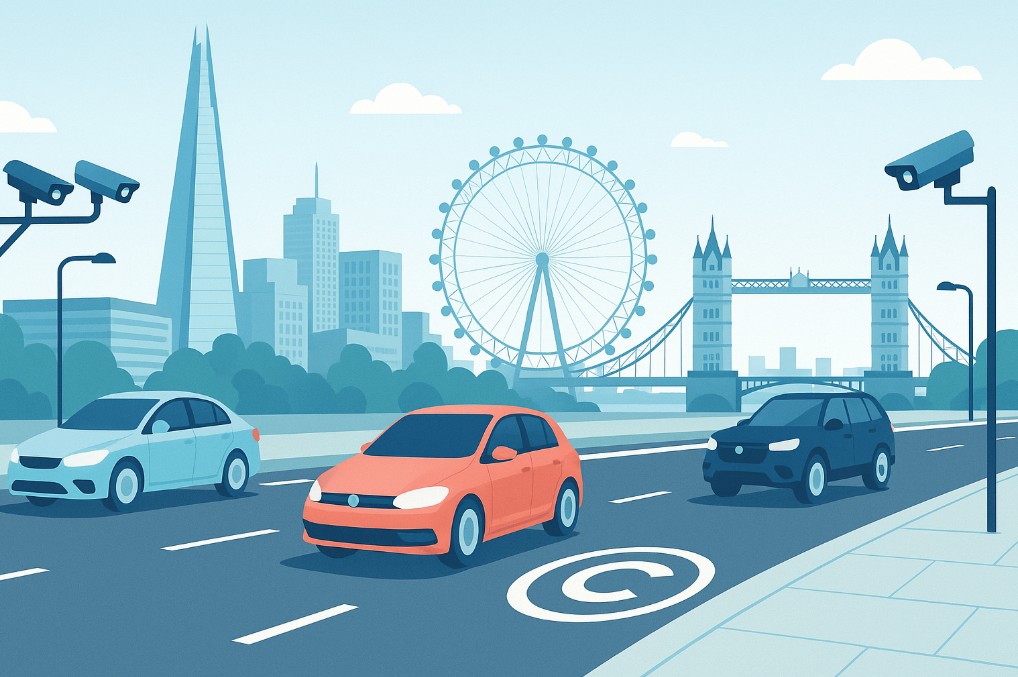Table of Contents
ToggleWhy Was the London Congestion Charge Introduced?
Have you ever wondered why drivers in central London are charged a fee? The Congestion Charge was introduced by Transport for London (TfL) in 2003 to tackle one of the capital’s biggest problems: traffic congestion. London is one of the busiest cities in Europe, and with so many vehicles on the road, travel times, air quality and the overall environment were suffering.
By charging drivers to enter specific parts of the city, the scheme encourages fewer unnecessary car journeys, promotes the use of public transport, and supports London’s efforts to reduce pollution. The Congestion Charge Zone (CCZ) covers central areas such as Westminster, the City of London, and parts of Camden and Kensington, making it important for both residents and visitors to understand the rules.
Do You Pay the Congestion Charge on Sunday?
Yes, drivers must pay the Congestion Charge on Sundays, but only between 12:00 (midday) and 18:00 (6 pm). This means that morning and evening journeys are not charged, but anyone entering the zone during the afternoon must pay the daily fee.
There are two exceptions to this rule: there is no charge on Christmas Day and New Year’s Day bank holiday. On all other weekends and bank holidays, the Sunday hours still apply.
The daily fee is £15 if paid in advance or on the same day. If payment is made by midnight on the third day after travel, the charge increases to £17.50. Failing to pay leads to a Penalty Charge Notice (PCN) of £160, which is reduced to £80 if paid within 14 days.
What Are the Operating Hours of the Congestion Charge?
The Congestion Charge is not a 24-hour system; it applies during specific hours of the week.
| Day | Charging Hours | Notes |
| Monday to Friday | 07:00–18:00 | Standard weekday charge applies |
| Saturday, Sunday & Bank Holidays | 12:00–18:00 | No charge before noon or after 6pm |
| Christmas Day & New Year’s Day Bank Holiday | No Charge | Applies to all drivers |
For weekday commuters, the morning rush hours are fully covered by the scheme. For weekend visitors, the midday to evening charge is designed to reduce the busy shopping and leisure traffic in central London.
How Can You Pay the Congestion Charge?
TfL offers several secure and reliable ways to pay the Congestion Charge. Drivers can pay in advance, on the day of travel, or by midnight of the third day after travel. Payments made later than this deadline will result in a penalty.
The most convenient method is Auto Pay, which automatically records the number of charging days a vehicle travels within the zone each month and takes payment from a linked debit card, credit card, or direct debit. For many frequent drivers, this removes the risk of forgetting to pay.
Payments can also be made online through the TfL website, by phone, or via the TfL “Pay to Drive in London” app, available on Apple App Store and Google Play. The app also allows drivers to check if a postcode falls within the Congestion Charge Zone, manage their account, view payment history, and pay penalties.
For those who prefer, a London Road User Charging account can be created to manage multiple vehicles, store payment details, and allow shared access for up to five people.
What Happens If the Congestion Charge Is Not Paid?

If the Congestion Charge is not paid by midnight of the third day after travel, TfL will issue a Penalty Charge Notice (PCN). The standard fine is £160, though this is reduced to £80 if settled within 14 days.
The penalty system is strict, and repeated failures to pay can lead to further enforcement action. To avoid unexpected fines, drivers are strongly advised to either pay promptly after each journey or register with Auto Pay.
Who Does Not Have to Pay the Congestion Charge?
Not all drivers need to pay the Congestion Charge. TfL provides a list of exemptions and discounts that apply in certain circumstances.
For example, residents who live within the Congestion Charge Zone are entitled to up to a 90% discount. Blue Badge holders, motorcycles, mopeds, and emergency service vehicles are fully exempt. In addition, some Ultra Low Emission Vehicles (ULEVs) are either exempt or eligible for reduced charges if registered with TfL.
How Is the Congestion Charge Different from the ULEZ?
A common mistake is to confuse the Congestion Charge with the Ultra Low Emission Zone (ULEZ). Although both schemes are operated by TfL, they serve different purposes.
| Feature | Congestion Charge | ULEZ |
| Hours | Weekdays 07:00–18:00; Weekends 12:00–18:00 | 24/7, every day of the year |
| Purpose | Reduce congestion | Reduce pollution |
| Area | Central London | Wider London boroughs |
| Cost | £15–£17.50 daily | £12.50 daily (cars, vans); £100 daily (HGVs, buses) |
This distinction means that even if a driver avoids the Congestion Charge by travelling outside its hours, they may still need to pay the ULEZ charge if their vehicle does not meet emission standards.
What Are the Best Ways to Avoid Paying Extra Charges?

For drivers planning a trip to London on a Sunday, there are practical ways to avoid unnecessary costs. Travelling before 12pm or after 6pm avoids the Congestion Charge completely. For those who must travel during chargeable hours, setting up Auto Pay ensures no late payment fees.
It is also important to check whether a vehicle complies with ULEZ standards, as this applies 24 hours a day. Many visitors choose to leave their cars at stations outside London and continue their journey using public transport, which often proves cheaper and more convenient than driving.
Conclusion: Do You Pay Congestion Charge on Sunday?
Yes, drivers are required to pay the £15 Congestion Charge on Sundays if they enter the zone between 12:00 and 18:00. There is no charge on Christmas Day or New Year’s Day bank holiday, but on all other weekends and holidays the rules apply. Payments can be made in advance, on the day, or within three days of travel, though late payment increases the fee to £17.50.
By understanding the rules and differences between the Congestion Charge and ULEZ, drivers can plan their journeys more effectively, avoid penalties, and make more informed choices about whether to drive or use alternative transport options in central London.
FAQs
Is the Congestion Charge active on all bank holidays?
No, the Congestion Charge does not apply on Christmas Day or New Year’s Day bank holiday, but it does apply on other bank holidays between 12:00 and 18:00.
How much does it cost to pay late?
If paid by midnight on the third day after travel, the daily fee rises to £17.50. Beyond this point, a Penalty Charge Notice of £160 is issued.
Are electric cars exempt from the Congestion Charge?
Yes, fully electric vehicles are currently exempt, provided they are registered with TfL.
Can the Congestion Charge be paid in advance?
Yes, drivers can pay up to 90 days in advance, either for single days or multiple journeys.
What is the TfL app used for?
The TfL “Pay to Drive in London” app allows users to pay charges, set up Auto Pay, manage vehicle details, and check if a destination falls within the charging zone.
Do motorcycles have to pay the Congestion Charge?
No, motorcycles, mopeds, and scooters are exempt from the charge.
What is the difference between the Congestion Charge and ULEZ?
The Congestion Charge reduces traffic and applies during set hours, while ULEZ reduces pollution and applies 24 hours a day, every day of the year.




